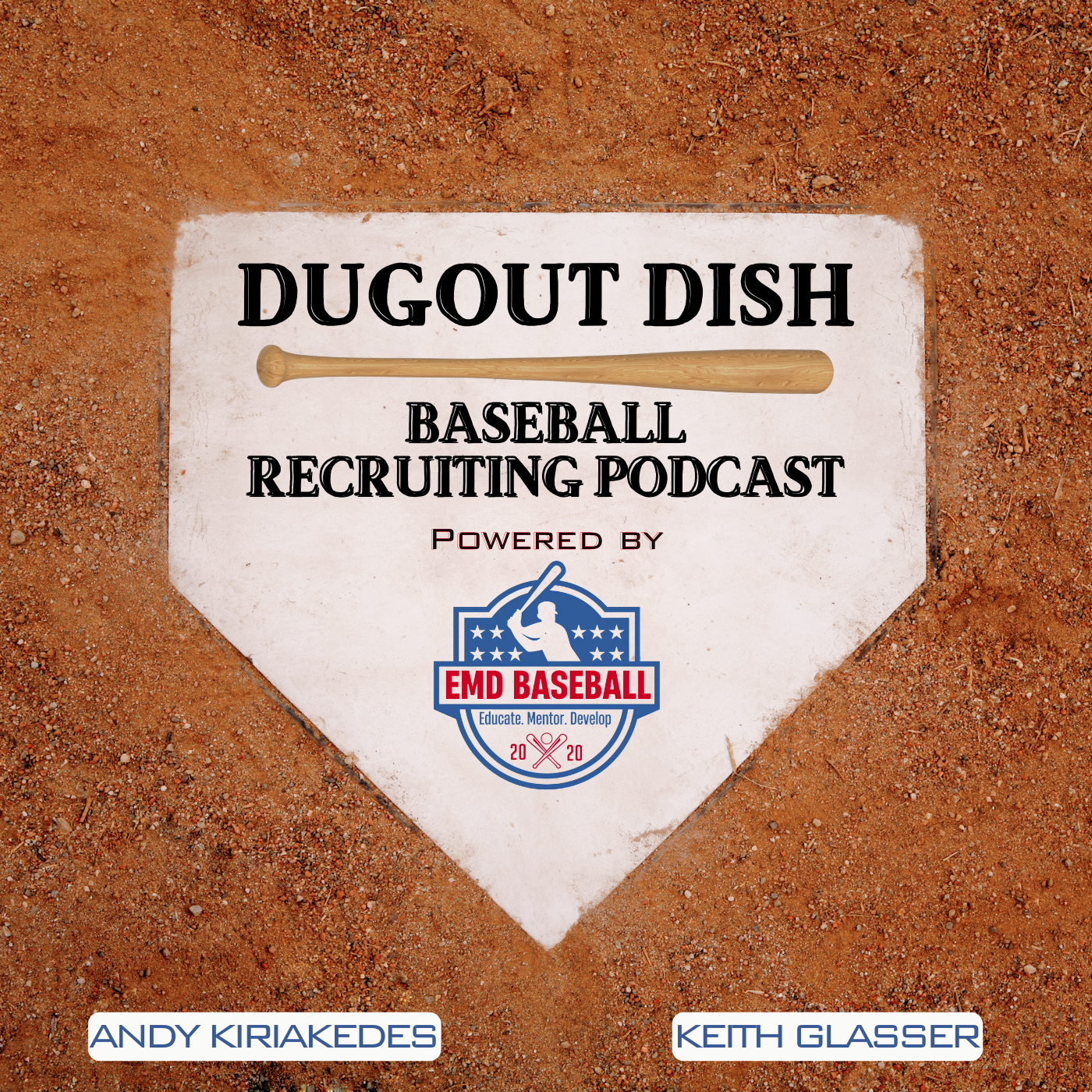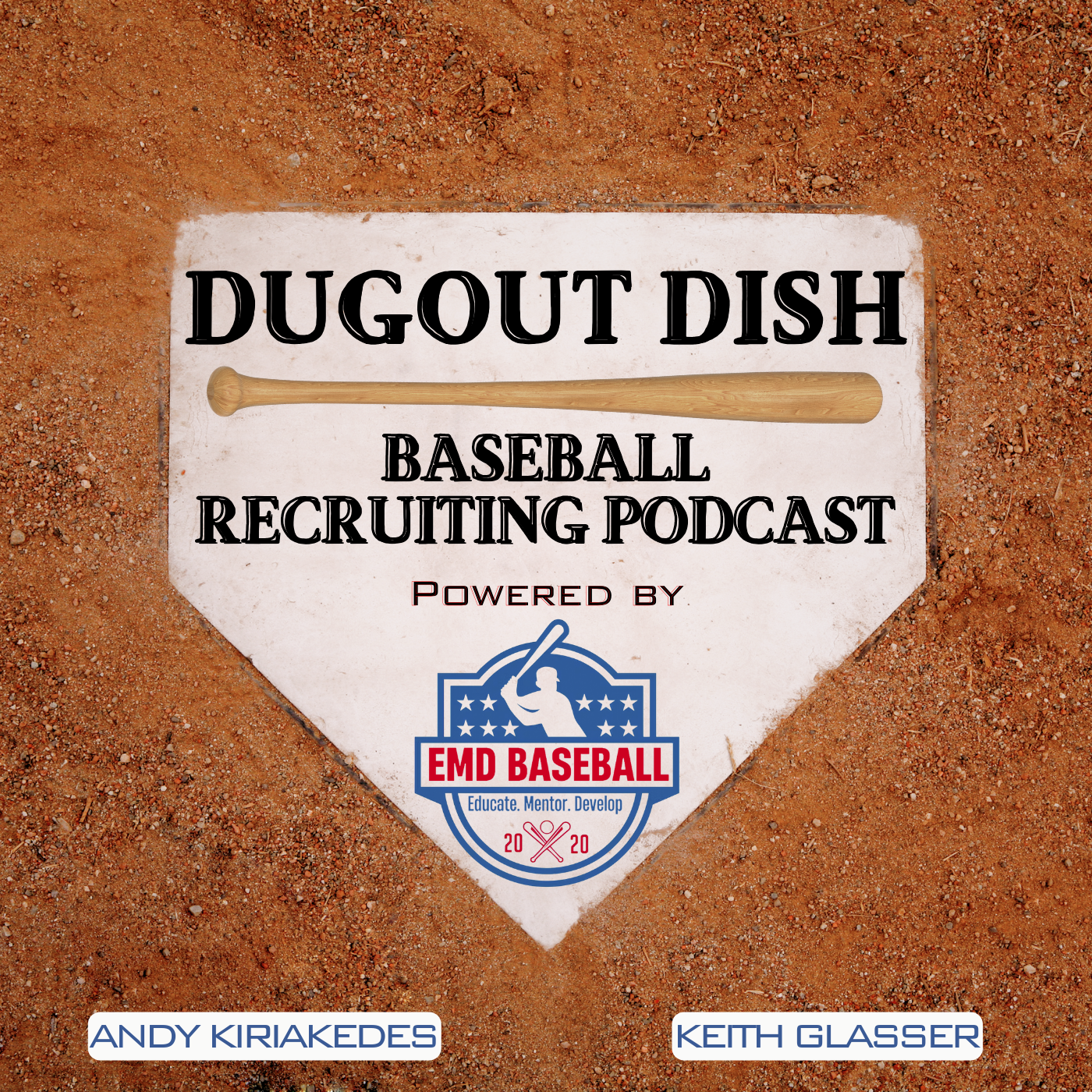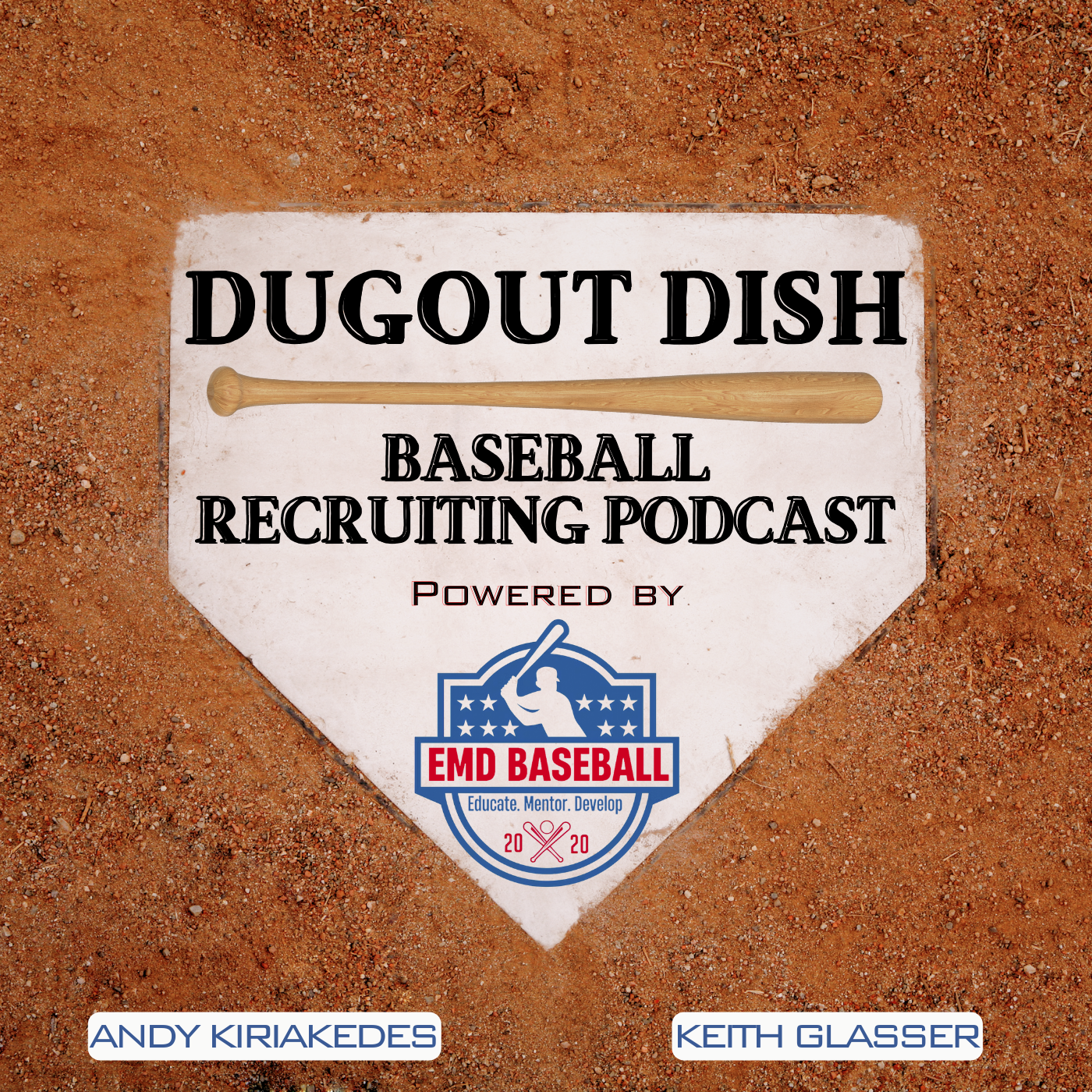Episode Transcript
[00:00:00] Speaker A: Foreign.
[00:00:11] Speaker B: Welcome to this week's edition of in the Clubhouse with EMD Baseball. I'm Andy Kiriatides, joined by my wonderful co host Keith Glasser. How are we doing?
[00:00:20] Speaker A: Great. How are you?
[00:00:21] Speaker B: Good.
We're going to talk about getting to second base.
Right.
And why. That is a popular phrase amongst college coaches when they are evaluating position players.
And essentially what they're getting at is when they're evaluating players, you're trying to figure out what in his skill set allows him to get to second base, which for all of you should know, is scoring position. There's generally two ways to do it. You hit a lot of doubles or you get on base a lot and you can really run.
And this isn't the end all, be all, but it is something that comes up often in conversation, specifically with guys who do do not play premium defensive positions. Right. Catcher, shortstop, center field, second base, you could probably throw in there.
Those guys get a little bit of leeway, but we want to take a little a minute here and kind of unpack that phrase and highlight why that's important. And I think it's important not to only understand it from an evaluation perspective, but for the young cats who are listening to this, I think it's important for you to understand from a development perspective that if you're a 14 year old and you hit a lot of singles and you're not a great runner, well, we need to get really strong, right? The, the weight room is going to really be an important piece of the puzzle here.
If we can really run, maybe we need to sharpen that, that stolen base part of our game so that we can be the guy who can get to first base with singles and walks and putting pressure on defenses. And we can get to second because we got some. We got the ability to run.
So let's unpack that for a second. What are your, what are your initial thoughts on this particular topic here? Coach?
[00:02:22] Speaker A: I think that it is paramount for first baseman, third baseman, corner outfielders to be able to get themselves to second base.
The generally speaking, this is a blanket statement.
I'm going to want my corner guys in the infield to be able to hit doubles. My corner outfielders can do either or either hit doubles or get the first base and really be able to run to get to second, give themselves in scoring position.
Can. And you do that at third base and first base? Yeah, you can. But by and large, you're going to see some guys that are like, they're going to be a little bit more offensive in those Positions.
You know, I think that it's something that all coaches are going to want to recruit and I think that there are, you can play yourself into it by being able to play the game the right way too. From being able to base run, be able to run hard out of the box, you know, not Cadillac doubling, not having a celebration before you get to second base. I'm going to sound old here, but your oven mitt in the back pocket, all of those things, right? Like if you legitimately want to get noticed and I know that this is hard to do in this era of baseball, like if you want to get noticed and you want guys to legitimately want to recruit you, play the game hard, run hard out of the box, try to get a double every single time. Not say like make the, and what I mean by that is make the outfielders stop, you know, from going to second base, slide hard into basis, do all of those things that are going to be able to, that don't show up on a stat sheet, if you will for the proverbial term.
But I think the ability to get the second bases, especially at the high school level is something that I don't want to say goes unnoticed or is likely is a little under coached. But that's what we're looking for.
We can find a lot of guys that can hit singles.
We want guys that can generate some bad speed. And it goes back to the metrics piece and all the other stuff where like yeah man, it's great that you have 100, 100 exit velo, but that say it all the time. It needs to show up in game.
I want to see that stuff show up in game. If you're not going to be 100 exit vlog, I be a dude who's on the barrel all the time, who can steal some bases, who can run the bases the correct way, who runs the bases hard and does all of those things because that stuff shows up and people want to recruit that because those are things that they then don't have to teach you. And when you get to campus you're already going to be further ahead because now we can get into some more advanced stuff because you're further ahead. But I think the, the ability, especially in the corner infield to be able to generate some bad speed and hit doubles. And then, you know, like I said, the corner outfield spot, it can be either, right? Like I'm going to want, you know, I, I generally recruited, and I'm only speaking from my own experience, I recruited speed in the outfield you know, generally speaking, all my outfielders were going to be sub-760s, usually around a 6, 7, 6, 8. So we had the ability to hit doubles. And then also if we walk or get hit by a pitch and do those things to get to second base, to be able to put ourselves in scoring position, to be able to score.
I also wanted the ability with that type of speed and especially in our outfield, that with two outs we can score from first base on a double.
Right. Like, I'm hoping that we have a guy, you know, we have other guys in our lineup that can bang doubles, that we can score from first base too. So, you know, it's the speed aspect of things. Can't go understated. But I think the ability that you can possess and develop into to be able to get yourself to second base at a regular clip is only going to enhance your recruitability in the long run.
[00:06:28] Speaker B: Yeah, it's.
It's really hard to score runs playing base to base.
And guys who can run to your point, they can go first to third, they can score on a double from first base, they can get on base, and it's essentially a double.
It's such an advantage, right? And then there's obviously the, the immediate impact you can have in the outfield, specifically if you're a really good runner. From a defensive standpoint, being able to track balls, cut off balls, keep would be doubles to singles. Like, there's a ton of value in it with the quality of pitching and some of the stuff that's getting thrown out there at all levels of college baseball.
Doubles, they move the needle big time in terms of being able to put pressure on an offense, put up some crooked numbers.
It's just, it's really hard to string together a lot of singles and play base to base. And that's why coaches are going to look for guys that have a tool set that allows them to get to second base more often than not.
Once again, these are not absolutes.
Right. There are other cases of guys who are really successful that don't fit either of those molds.
But we try to focus on things that these coaches are looking for to try to educate folks on how they view it from an evaluation standpoint. And most college coaches are going to look for guys that can do things that are impactful, specifically from the offensive side. Right. Defense is a different. Is a different conversation.
But for an offensive side, they're looking for guys that have a tool set and a track record. Just as importantly, to your point, you got to be able to Bring those tools into the game, a tool set and a track record that allows them to be impactful from an offensive perspective. And there's usually two ways to be impactful. With your legs or you hit a bunch of stand up doubles.
So for the high school kids and parents who are listening to this, this information should hopefully shed a little bit of light on what coaches are looking for. But it also should give you a little bit of a North Star on what you should be focus focusing on from a development standpoint.
If you're not a great runner, but you're big and strong, we need to get to work on getting stronger, tightening up that swing and make sure that we're putting together a bats, getting good swings off so that we can be impactful from the batter's box. If you're there, that kid that can really run. Maybe our approach to how we develop offensively is going to be a little bit different.
Food for thought there.
[00:09:20] Speaker A: I concur, you know, it's its development piece to get to that point.
I think is, is what is going to give you the opportunity to be able to become recruitable at a lot of different institutions and programs.
You know, and again, this is, this is a general blanket statement. But everybody who's going to recruit in college is going to love guys who can hit doubles or guys who can run, who can get themselves in a scoring position, because that's generally going to mean that you're going to score a lot more runs. Now obviously all the other stuff has to go with this. You got to be able to play defense, got to be able to base run, you got to be able to do a lot of these things.
But from an offensive perspective, if you can do that on a consistent basis, you're going to find yourself with a lot more opportunities to be able to play at the next level than if you can't do it at a consistent clip.
[00:10:24] Speaker B: Well said.
Anything else you want to add to this topic?
[00:10:30] Speaker A: No, sorry for the pause.
[00:10:33] Speaker B: All right, well, thank you for listening everybody. Hopefully that was insightful for you.
Tune in next week, we'll have another topic for you. Thanks everybody.
Thank you for listening this week. If you're watching on YouTube, go ahead and hit that subscribe button and smash that like button for us. Check us out on Apple Podcasts, Google podcasts as well as Spotify. You can follow us on Twitter and Instagram MD Baseball. If you want to find out what me and Keith do to help families and players navigate the recruiting process, go ahead and check us out on emdbaseball.com take a few minutes to check out our new online academy. I promise you'll get some good information out of that. Thanks again for listening. Check in with you next week.
It.


